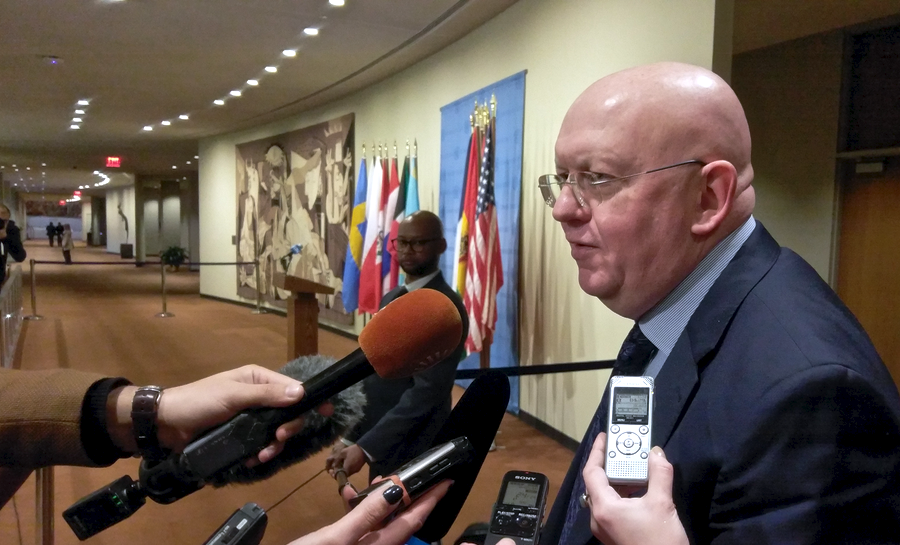Remarks by Ambassador Vassily Nebenzia, Permanent Representative of the Russian Federation to the United Nations, following UNSC consultations on the humanitarian situation in Raqqa
Q: Can you tell us about your meeting in Raqqa? Why you called it in?
A: We said in our statement that Raqqa is a neglected city in a way. The humanitarian situation there is dire. And somehow we never discuss Raqqa, we discuss other areas in Syria, other cities which also suffer. We’ve never talked about Raqqa which was razed to the ground and is not being restored. There are a lot of humanitarian problems there, no demining, corpses are decaying under rubble. People cannot return to their homes. We had a briefing by OCHA. There was no full assessment of the situation in Raqqa by the UN so far, unfortunately. We still urge OCHA to conduct such an assessment. We need to do something about that city because the population cannot return to their homes as the city is basically devastated.
Q: What is the solution of this? Does Russia think it is a good idea? Should you hand back to the Syrian government? Should there be the UN peacekeepers? What would you propose?
A: I think that those who fought ISIS there and ruined the city should also take responsibility of restoring it, but so far the process is going very slowly. That was the point of the meeting.
Q: What about Sochi? Do you think the UN participates in it?
A: We think that it is in the interests of the UN to participate. Because Sochi is not a stand-alone event but a contribution to the UN process.
Q: One of the concerns of the opposition leaders, Syrian opposition, that it looks like an alternative for Geneva.
A: We are trying to assure them all time and again that this is not an alternative to Geneva, but a process that is to contribute to Geneva, to the UN-led process. We are saying to everyone starting from the Secretary-General, to Staffan de Mistura, all the participants of the Syrian government, the opposition, everyone. And to our fellow member-states.
Q: Could you explain specifically – what is the aim of such a meeting?
A: The aim is to reinvigorate the UN-led Geneva process aimed at the political solution in Syria.
Q: And what about North Korea? Any reaction to inter-Korean talks today?
A: My personal reaction? I welcome that they started talking to each other. That is what we are saying all the time. That in order to solve something, people at least need to start talking.
Q: Do you think the Council should now get involved given this now posted development? Even the Council should follow through maybe a statement on this and also the discussion South Korea suggested, maybe that some sanctions could perhaps be lifted for the Olympics.
A: I understand this is a unilateral decision for the time of the Olympics. I hope there is progress on this track. We really have to see how the situation evolves.
Q: Did you meet the Syrian opposition delegation while they were here. And what do you think about the lobbying against the Sochi?
A: I didn’t meet anyone from the Syrian opposition.
Q: Why not stick to Geneva track? Why is there a need for Sochi track?
A: Do you see much progress in Geneva? I hope there will be another round in Geneva before Sochi and I hope that this round will be more fruitful and it will contribute to Sochi and then Sochi reciprocally will contribute to future “Genevas”.
Q: General McMaster was in the building today. I mean did you have an interaction with him?
A: He briefed us on Afghanistan, it was very helpful. Most of the points that he raised I would agree with. He mentioned the need for Russian-US cooperation in Afghanistan. I fully agree. I said that President Putin at a press-conference last December thanked NATO for being in Afghanistan and he stressed the need for Russia and the USA to cooperate on that issue.
Q: Was that a bilateral meeting?
A: No, it was a briefing for the Security Council.
